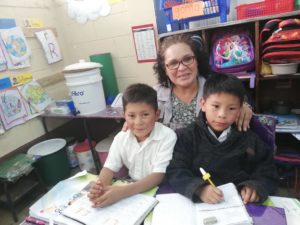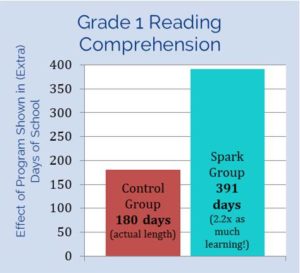Think back to first grade. Do you remember your teacher? Do you remember walking into your classroom and seeing labels all around the room to help you learn to read words like “door”, “clock”, “desk”? Unfortunately, first graders in rural Guatemala often have a starkly different classroom experience. Teachers have never learned how to effectively teach reading or how to engage their students in the reading process. Classroom resources and storybooks are sparse.

Liseth with two of the first graders in her class
Liseth has been a teacher for 26 years in the Santiago Sacatepéquez region of Guatemala and she has taught first grade for 17 of those years. Liseth had been hoping and waiting anxiously for her school to be part of the Spark Reading Program. Then one day, she finally got the call she’d been hoping for from Spark trainer Milton Ramos, informing her that her school would be joining the program. Liseth was ecstatic to start her training! “If we keep teaching like we did 15 years ago, forget it! We would be creating a backwardness in our children; we always have to be aware of the new technology and teaching techniques.”
So, what exactly is this Spark Reading Program that Liseth was so eager to join? How does it actually work?
The Spark Program empowers teachers across the country to teach reading more effectively in their own classrooms. By involving teachers in two years of intensive training, Spark makes sure that educators are prepared to help every one of their future students learn to read, and read well. The youngest Spark students start with learning about their ABCs and acting out stories. First, second, and third graders’ lessons include authoring their very own books. Then, the upper grade Spark students learn to summarize what they read and focus on identifying the main ideas. Teachers like Liseth also receive a rich classroom library of 60 to 200 high-quality children’s books (depending on grade level and class size), which enables them to read with their students every day.

That sounds amazing! Is illiteracy that much of a problem in Guatemala?
Yes, one third of indigenous Guatemalans cannot read or write. In Guatemala, poorly trained teachers use ineffective techniques to teach reading, emphasizing rote memorization instead of recognizing letters and sounds, comprehension, and critical thinking. Kids become bored and fail to learn to read, leading to high dropout rates: 80% of rural indigenous children who begin primary school will not complete it. Without adequate reading skills, these young people enter adult life unable to read their electric bill, a voting ballot, or even the label on a bottle of medicine. They remain targets of exploitation and injustice, and the cycle of poverty continues for them and their families.

Who doesn’t want to read about zebra fish…and there’s 199 more books still to be read!
Yikes! Those obstacles sound insurmountable.
Nope—and CoEd has the results to prove it! CoEd collaborated with University of Cincinnati researchers on a randomized control trial to determine how much the Spark Program truly improves early reading. Students were evaluated in eight different areas including reading fluency, alphabetic principles, and oral language. And the results? Well, they speak for themselves! First grade Spark students achieved more than the control group in six out of the eight areas. What’s even more impressive is that in the 180 days of the Guatemalan school year, Spark students advanced in reading comprehension as if they had gone to school for 391 days. That’s right —students in the Spark Program are learning to read more than twice as fast as their peers! You can’t see us, but we’re jumping up and down for joy over here!

Click here to read the full report.
So, did the program live up to Liseth’s expectations?
The answer is a resounding YES! Liseth sings the praises of the Spark Reading Program. She attended every single Spark training and eagerly listened during the sessions. Now that she has participated in the Spark training, she has found more ways to not only involve her students in their learning, but their parents, as well. She tells her students that it doesn’t matter if they don’t have money to travel to learn about other parts of the world — by reading, they are able to explore new places. “Reading opens a new world to us; the imagination is blown up, and when a student finds that feeling of joy by having a book in hand, the work is done. A child who reads is an adult who thinks.”
Interested in supporting teachers like Liseth?
